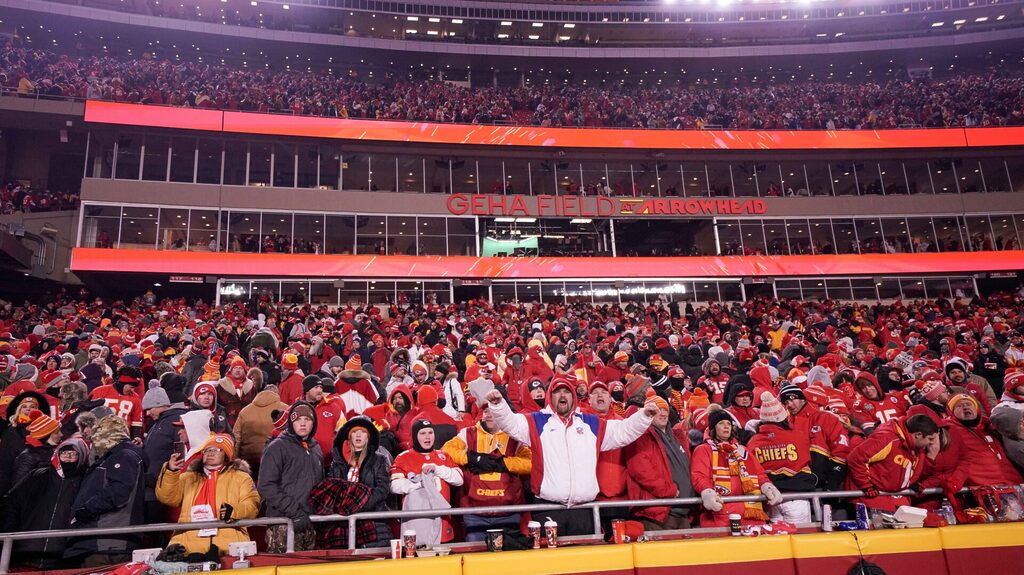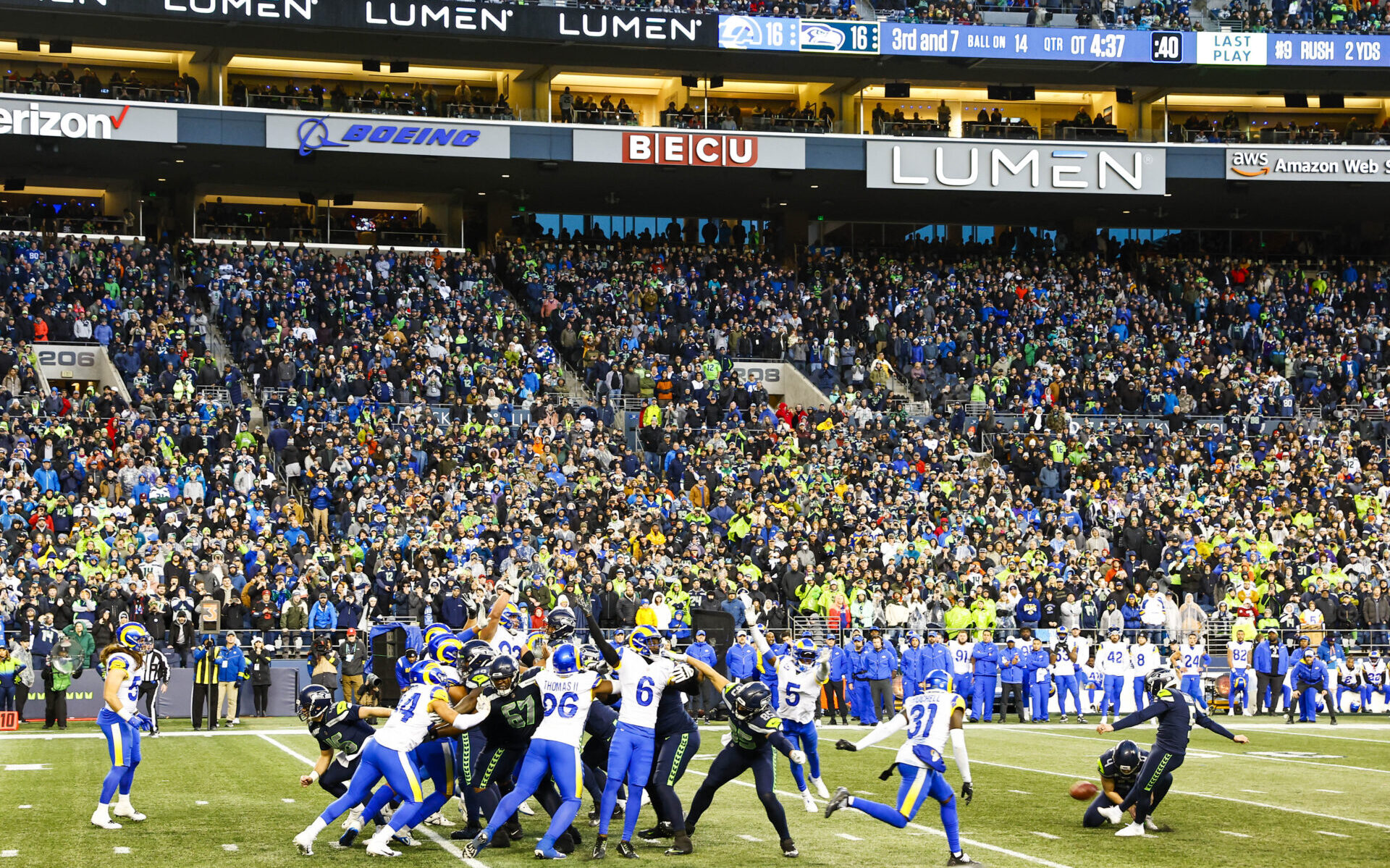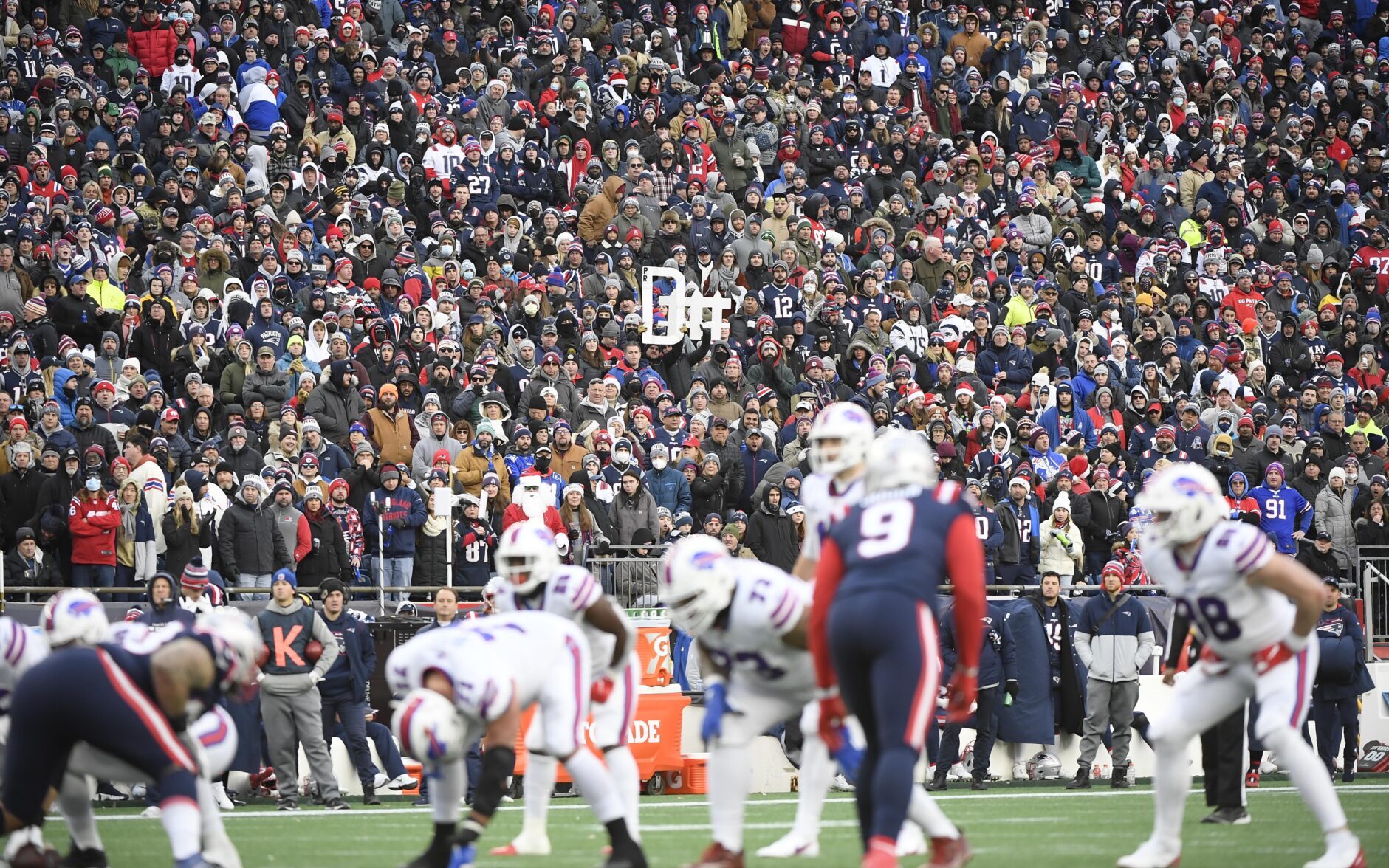Analysis
7/6/23
9 min read
Which NFL Teams Actually Have Home-Field Advantage?

Is it the weather? The noise in the stadium? The quality of the turf or grass? Maybe even the time zone?
Regardless of the factors — and we will explore them all — home-field advantage in the NFL does exist. It’s simply as mercurial as Tyreek Hill with the ball in his hands.
Indeed, the rate at which hosts come out on top is not as overwhelming as many might think: 55 percent of the 2,580 contests during the last decade. Those include the Jacksonville Jaguars going 4-5 in home games in London; there were no international matches during the 2020 season.
So, for those imagining blistering temperatures in Florida during September and frigid conditions on the tundras of Buffalo and Green Bay being extra meaningful, well, sometimes that’s true, and others, they don’t matter.
“It really depends on how strong a team you have,” Kansas City Chiefs coach Andy Reid has said.
As we will see, Reid is an expert on the home-field subject.
Home-Field Advantage Analysis
Powerful Performances
The two most successful teams during the last decade, the New England Patriots and Chiefs, have also been the toughest to beat at home, each winning 61 times, though a 2015 Chiefs victory against the Detroit Lions was played in London.
A caveat, though: consider in the last three seasons without Tom Brady, the Patriots are 13-12 at Gillette Stadium. The elements haven’t changed in Foxborough, nor has the venue or the head coach. But the quarterback left, and with him, so did the aura of invincibility.
Not so in Kansas City, where the Chiefs have had a winning mark in the last 10 seasons since Reid arrived as coach. Since Patrick Mahomes became the starter in 2018, they are 32-9 at Arrowhead in the regular season. No other NFL franchise has posted a winning record in each of those seasons, with the Pittsburgh Steelers and Green Bay Packers coming closest, marred by one .500 campaign each.
The Chiefs, however, are not one of the clubs to go unbeaten at home in any of those 10 years. The Packers and Patriots accomplished it twice, with the Denver Broncos, Cincinnati Bengals, New Orleans Saints and Carolina Panthers doing it once.
Kansas City and New England each have 61-20 marks (.753 winning percentage at home), followed by Green Bay’s 59-20-2 (.741) and Pittsburgh’s 56-24-1 (.698).

Divisional Data
Only twice in the last decade have all four teams in a division managed winning home records. The NFC West did so in 2013 (Seattle Seahawks 7-1, San Francisco 49ers and Arizona Cardinals 6-2, Los Angeles Rams 5-3), and it was 2021 for the AFC North (Steelers 6-2-1, Cleveland Browns 6-3, Baltimore Ravens and Bengals 5-4). Seattle won the Super Bowl in 2013, and Cincinnati made it in 2021.
No division has collapsed so badly at home that each club was under. 500 in a season, though the NFC East came close in 2020. The Dallas Cowboys went 4-4, the Philadelphia Eagles went 3-4-1 and the Washington Commanders and New York Giants were 3-5.
So did the NFC South in 2014 when Carolina finished on top despite only a 4-4 mark in Charlotte, with the other clubs going 10-14. Even worse, the AFC East was so lopsided in 2018 that New England went 8-0, and the other three teams were a combined 5-19 at home.
Both South divisions and the NFC East have had three seasons in the past 10 when a trio of its teams were overall losers at home, including 2022 when the Jacksonville Jaguars were 5-3 at home (one loss was to Denver in London), the Tennessee Titans were 3-5, the Indianapolis Colts went 2-6 and the Houston Texans finished at 0-7-1.
We’ve even had division winners who slumped at home in that campaign, most famously when Washington took the NFC East in 2020 at 7-9, going 3-5 at FedEx Field. Carolina was a meek 7-8-1 and 4-4 at home in 2014 when it captured the NFC South title. The 2013 Eagles won their division despite a 4-4 mark at Lincoln Financial Field, and the 2017 Rams were 3-4 at the L.A. Coliseum — they beat Arizona as the host in London — yet won the NFC West.
Super Seasons
All the Super Bowl champions in the past decade were winners at home, though not as dominant as expected. Oddly, the Chiefs and the Brady-led Tampa Bay Buccaneers were only 5-3 as hosts.
In 2019, Kansas City captured its first title in 50 years as the Chiefs won their final four at Arrowhead and two more in the postseason. Tampa Bay was 5-3 in 2020 as a wild card before winning its playoff trips to Washington, New Orleans and Green Bay to get to the big game, becoming the first home team to host it. In 2021, the Rams also were 5-3 in the first season with fans at SoFi Stadium, where they eventually won the Super Bowl.
In 2013, Seattle went 7-1, as did New England in 2014. Denver was 6-2 in 2015, as was New England again in 2016; Philadelphia finished 7-1 at home in 2017, and the Patriots — noticing a pattern? — rode a perfect home mark in 2018.
Last season, the Chiefs and Eagles won seven home contests and two more in the playoffs before Kansas City edged Philadelphia for the Lombardi Trophy.
Yearly Breakdown
Including some international matches or neutral-site games caused by weather issues, hosts went 1,431-1,149 over the past decade. Home teams were most dominant in 2018 with a 153-101-2 record and .602 winning percentage, barely in front of 2013: 153-102-1 (.600). New England and Cincinnati led the home-field forces with spotless 8-0 marks in 2013, and the 8-0 Patriots plus four teams at 7-1 paced the dominance in 2018.
But here’s where one of the most impactful elements of home-field advantage came into play: During the 2020 season, amid the COVID-19 Pandemic and, almost from beginning to end in empty stadiums, visitors won more often than they lost. They went 128-127-1 (.502). Still, that indicates having fans in the stands makes a difference.
The "Whys"
Ask any coach and nearly every player about the machinations of playing at home, and they will break out the cliché book. Such as citing the crowd as the “12th Man” in Seattle: "The 12s have an unparalleled impact on game days,” coach Pete Carroll has insisted.
They will play it down, as all-time winningest coach Don Shula did many years ago, saying, “Both teams play in the same elements, so the team that adapts best will win.”
The truth is, there are so many factors that play into home-field advantage, and while fan support is often crucial, as 2020 showed, not all of them are necessarily significant.
For example, it would not be a leap to say Lambeau Field should provide the biggest home edge among the 30 NFL stadiums. And the Packers have gone 59-20-2 in the last decade, third-best overall. But in the playoffs, when the conditions should overwhelmingly favor the Packers, they are 4-3 since the 2013 campaign, with the January losses coming against the 49ers and Buccaneers – hardly cold-weather outfits.
Weather isn’t even a contributor in 10 indoor NFL stadiums and rarely comes into play in places like Nashville, Charlotte, San Francisco and Seattle.
A stronger argument can be made for time-zone travel, most notably for Western clubs heading east. A 1 p.m. ET kickoff is a morning game for the Seahawks, Rams, Chargers, Cardinals, Raiders and 49ers. That can be far more disruptive than the weather.
Keep a watch this season for how those six teams fare in such situations, which are more important late in the schedule. In Week 17, the league has the Raiders, Rams, Cardinals and 49ers in the East. In Weeks 9 and 11, three Western clubs travel across the country.
Even the altitude in the Mile High City seems conquerable. Then again, the Broncos have been quite conquerable since Peyton Manning guided them to the 2015 championship. Denver is 27-30 at home during the past seven seasons.
As for the field itself, the Super Bowl traction was, to be kind, messy. Such conditions are affected by the elements, of course, and places such as Pittsburgh, Baltimore and Washington can play tricks on special teams, particularly placekickers. But, as Shula wisely mentioned, it’s that way for both sides. Plus, few teams actually practice during the season in their own stadiums, so their edge often is marginal.
Perhaps the most unforgivable numbers emanate from the New Jersey Meadowlands: The Giants and Jets are a combined 68-93-1 at MetLife Stadium in the past decade.
Maybe we should take that back. The worst stench might come from Glendale, Ariz.: Somehow, the Cardinals have a better road mark (41-40) in the past 10 seasons than a home record (39-40-2, but with a loss in Mexico City as the host team).
Through all of this, odds-makers still insist being at home should be an automatic 3-point advantage in the point spread before roster strength is considered. We’re not convinced.

Team-by-Team Record Since 2013
Includes international and neutral-site games team hosted.
| Kansas City Chiefs | 61-20 (.753) |
| New England Patriots | 61-20 (.753) |
| Green Bay Packers | 59-20-2 (.741) |
| Pittsburgh Steelers | 56-24-1 (698) |
| Minnesota Vikings | 55-26 (.679) |
| Seattle Seahawks | 55-26 (.679) |
| Baltimore Ravens | 54-27 (.667) |
| Buffalo Bills | 52-29 (.642) |
| New Orleans Saints | 51-30 (.630) |
| Philadelphia Eagles | 49-31-1 (.611) |
| Dallas Cowboys | 49-32 (.605) |
| Cincinnati Bengals | 47-31-2 (.600) |
| Denver Broncos | 48-33 (.593) |
| Miami Dolphins | 47-34 (.580) |
| Indianapolis Colts | 46-35 (.568) |
| Los Angeles Rams | 45-36 (.556) |
| Carolina Panthers | 45-36 (.556) |
| Los Angeles Chargers | 42-39 (.519) |
| San Francisco 49ers | 41-40 (.506) |
| Tennessee Titans | 41-40 (.506) |
| Arizona Cardinals | 39-40-2 (.494) |
| Detroit Lions | 39-42 (.481) |
| Las Vegas Raiders | 38-43 (.469) |
| Atlanta Falcons | 37-44 (.457) |
| Tampa Bay Buccaneers | 37-44 (.457) |
| Houston Texans | 36-44-1 (.451) |
| Cleveland Browns | 35-45-1 (.438) |
| New York Giants | 34-46-1 (.426) |
| New York Jets | 34-47 (.420) |
| Washington Commanders | 34-47 (.420) |
| Chicago Bears | 33-48 (.407) |
| Jacksonville Jaguars | 31-50 (.383) |
Barry Wilner was a sportswriter for the Associated Press for 46 years. He has covered virtually every major sporting event, including 14 Olympics, 9 World Cups, 34 Super Bowls, the World Series, and the Stanley Cup Final, and has written 75 books. Follow him on Twitter @Wilner88.










